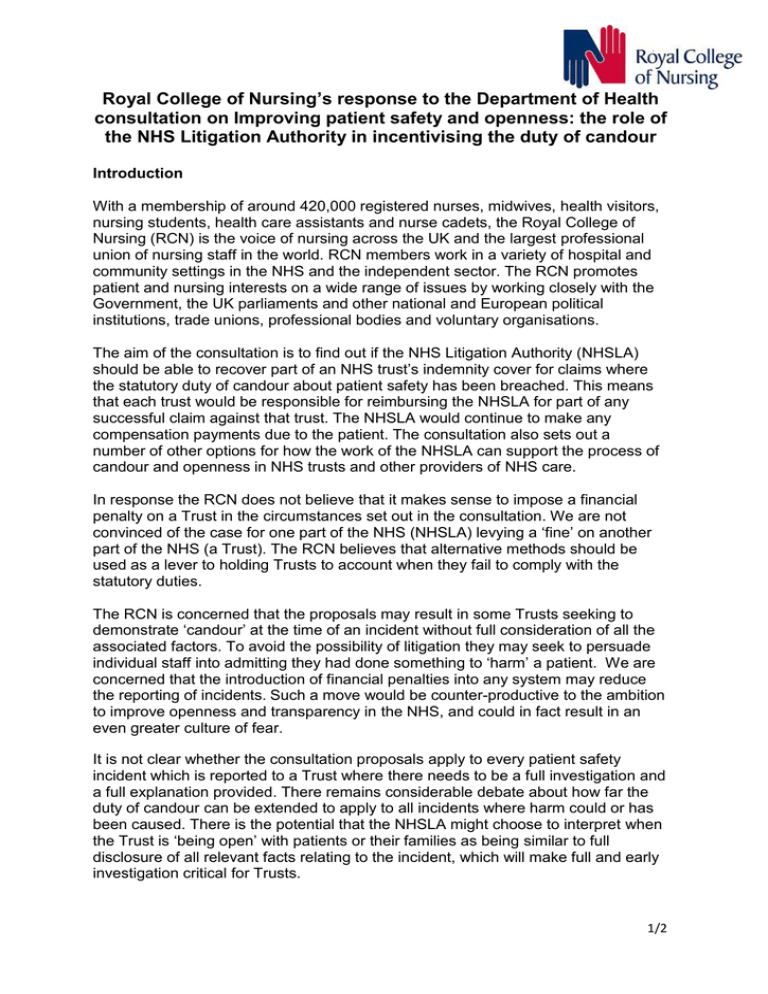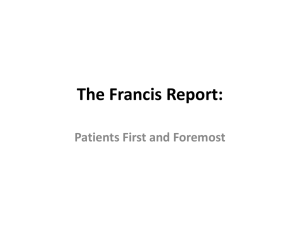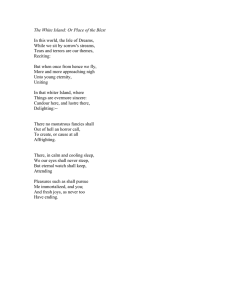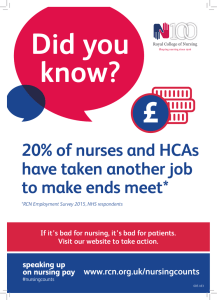’s response to the Department of Health Royal College of Nursing
advertisement

Royal College of Nursing’s response to the Department of Health consultation on Improving patient safety and openness: the role of the NHS Litigation Authority in incentivising the duty of candour Introduction With a membership of around 420,000 registered nurses, midwives, health visitors, nursing students, health care assistants and nurse cadets, the Royal College of Nursing (RCN) is the voice of nursing across the UK and the largest professional union of nursing staff in the world. RCN members work in a variety of hospital and community settings in the NHS and the independent sector. The RCN promotes patient and nursing interests on a wide range of issues by working closely with the Government, the UK parliaments and other national and European political institutions, trade unions, professional bodies and voluntary organisations. The aim of the consultation is to find out if the NHS Litigation Authority (NHSLA) should be able to recover part of an NHS trust’s indemnity cover for claims where the statutory duty of candour about patient safety has been breached. This means that each trust would be responsible for reimbursing the NHSLA for part of any successful claim against that trust. The NHSLA would continue to make any compensation payments due to the patient. The consultation also sets out a number of other options for how the work of the NHSLA can support the process of candour and openness in NHS trusts and other providers of NHS care. In response the RCN does not believe that it makes sense to impose a financial penalty on a Trust in the circumstances set out in the consultation. We are not convinced of the case for one part of the NHS (NHSLA) levying a ‘fine’ on another part of the NHS (a Trust). The RCN believes that alternative methods should be used as a lever to holding Trusts to account when they fail to comply with the statutory duties. The RCN is concerned that the proposals may result in some Trusts seeking to demonstrate ‘candour’ at the time of an incident without full consideration of all the associated factors. To avoid the possibility of litigation they may seek to persuade individual staff into admitting they had done something to ‘harm’ a patient. We are concerned that the introduction of financial penalties into any system may reduce the reporting of incidents. Such a move would be counter-productive to the ambition to improve openness and transparency in the NHS, and could in fact result in an even greater culture of fear. It is not clear whether the consultation proposals apply to every patient safety incident which is reported to a Trust where there needs to be a full investigation and a full explanation provided. There remains considerable debate about how far the duty of candour can be extended to apply to all incidents where harm could or has been caused. There is the potential that the NHSLA might choose to interpret when the Trust is ‘being open’ with patients or their families as being similar to full disclosure of all relevant facts relating to the incident, which will make full and early investigation critical for Trusts. 1/2 We note that the CQC can impose fines on trusts and our understanding is that this happens regularly. We would therefore have significant concerns that additional financial levers through the NHSLA would act as a crude tool in encouraging or managing candour. Q1: Do you agree that the NHSLA should share information with the CQC when its members do not provide evidence that they have discharged their statutory duty of candour by being open with patients about the matters that result in a claim? Yes, we believe CCQ should be informed as it is a key part of the intelligence gathering process relating to their inspection process and looking at the overall culture of individual organisations. Q2: Do you agree that NHSLA members should meet some or all of the costs arising from a compensation claim if they cannot confirm that they have discharged their statutory duty of candour in relation to that claim? No for the reasons stated in the introduction to this response. Q3: Do you agree that any reimbursement arrangements should cover the same areas that have an offence attached in the statutory duty of candour – that is to the initial verbal notification and the content of such a notification? No for the reasons stated in the introduction to this response. Q4: Which of the four options outlined in the consultation is the preferred approach, and why? The RCN does not support any of the options outlined in the consultation and we believe that non-financial incentives should be used to encourage candour. Q5: Do you have any other ideas on how candour about service failings could be incentivised through the NHSLA? The RCN strongly agrees that requirements should still be placed on service providers to incentivise their duty of candour. We have consistently highlighted the need for providers to put in place appropriate training and support, including psychological measures, for all of their staff, to enable the provider to discharge its responsibilities. The focus should be on each provider acknowledging responsibility for patient safety incidents, and communicating the information, given the systemic nature of such incidents, and that staff should be supported in relation to their professional responsibilities under the various regulatory bodies’ codes of ethical practice. Candour will only be effective as part of a wider commitment to safety, learning and improvement. Clear guidance, training and support for staff is critical in helping to understand their role in ensuring that patients and their carers receive meaningful and timely responses to their concerns and complaints. We believe that it is essential for staff at every level to exhibit the behaviours required to convey a sincere interest in feedback from patients and their families, no matter how hard it is 2/2 to hear. We also support an active role for the chief executive and non-executive directors in personally hearing feedback and complaints from patients and their families. Enabling and demonstrating professional attitudes and behaviours is a collective responsibility that ranges from development and implementation of government policy and professional standards, through to the actions of boards, ward leaders and individuals. Policy and International Department Royal College of Nursing, 27th March 2015 3/2


